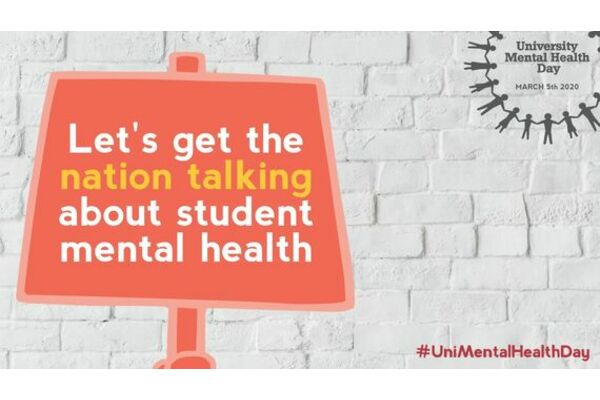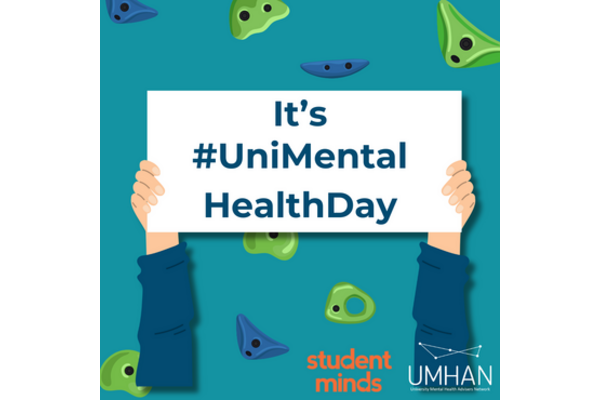Together - Uni Mental Health Day 2021
A general theme on which we would like to reflect for this year’s University Mental Health Day is the idea of togetherness. Most people’s lives have been impacted in some way by the restrictions imposed as a result of the Covid-19 pandemic, and we are all reckoning with the effects of being physically separated from friends and other sources of support. University Mental Health Day provides an opportunity to consider the universal challenges posed by our current circumstances, but also to take stock of the particular ways in which some members of the student community have been impacted. We also wanted to take this opportunity to highlight the work that UMHAN’s members do in order to counter isolation and exclusion, ensuring that students’ mental health does not become a barrier to the realisation of their ambitions.
Impact of Covid-19
Few will doubt that we are living through an era-defining moment which will have enduring consequences. In addition to the risk to physical health posed by Covid-19, some who have contracted the virus, and particularly those experiencing long-Covid, have reported neurological and psychological symptoms. Beyond that, the pandemic has radically altered the ways in which we live our lives, and has had a dramatic impact on livelihoods and opportunities, particularly of those within already marginalised and disadvantaged communities. The interaction between health and the contexts in which people live have been elucidated and emphasised with repeated urgency in recent years [i], such that the seemingly inevitable long-term consequences of the pandemic are being recognised [ii].
A report by the Sutton Trust published at the close of February 2021 has confirmed both the immediate impact on students of the lockdowns, as well as their fears in relation to the lasting effects on their futures [iii]. Data obtained from two surveys carried out in November 2020 and February 2021 highlight the impact of factors including the closure of campuses and the shift to online learning on participation, inclusion and wellbeing.
The Sutton Trust’s research documents the consequences of the pandemic in respect of student population as a whole. Participation in activities that provide much-needed balance to study, and which nourish relationships and support wellbeing are, perhaps unsurprisingly, down overall, with the survey revealing a decline in involvement in sports and societies of 18% from the previous year. (It is perhaps to be hoped that the widespread impact of the pandemic on inclusion and participation in co-curricular activities will bring to the fore many of the challenges already faced by students with disabilities. The Arriving at Thriving report, published in October 2020 by Policy Connect and the Higher Education Commission, sets out the difficulties faced by disabled university students in accessing the clubs and societies which enable social inclusion and participation [iv]).
The majority of students polled (87%) reported that their academic development had been adversely affected by the lockdowns; 70% of students reported that they were concerned for their own mental health. The rapid transition to online learning and the reconfiguration of some assessments, combined with the varying stances taken by universities on no-detriment and no-disadvantage policies, introduced significant disruption and confusion into student life.
Socio-economic inequalities
But the Covid-19 pandemic is not only a crisis in and of itself, it has also exacerbated pre-existing socio-economic inequalities which can be observed along and at the intersections of axes such as social class and ethnicity. The Sutton Trust report reveals that this is, as might be expected, as true for students as it is for those within the general population.
Students from less advantaged backgrounds have been hit particularly hard. A higher proportion of those from working-class families have had to return to living at home, in circumstances where they may have assumed the burden of caring responsibilities or where other family members have been impacted by the increased precarity of the labour market. Living at home, in tandem with the closure of university libraries and campuses, caused many to struggle with the practical requirements of online learning, which require a quiet place to work, a functioning computer and a stable internet connection with sufficient bandwidth. Nearly a quarter of those from working-class backgrounds reported having inadequate space in which to study. A larger proportion of students from BAME communities, already living at home during term-time at higher rates, have been living at home during the pandemic than their white counterparts. 27% of the BAME students surveyed reported difficulties in finding sufficient space in which to undertake their studies.
The long-term consequences of the pandemic are also discernible. Nearly 40% of the working-class students polled by The Sutton Trust in February 2021 reported that they were struggling to cover their living expenses during the pandemic, with many finding themselves unable to support themselves through work as a result of the constraints placed on the hospitality and retail sectors. The London School of Economics’ investigation of the impact of the pandemic on social mobility reports that students from low-income families are more likely to have delayed graduating than their peers from higher-income contexts [v].
The UK government has committed to providing £70 million of additional financial support for students at HE institutions in England, with different amounts being pledged by the Scottish, Welsh and Northern Irish administrations. The Sutton Trust has called for enhanced levels of funding to be provided, and has challenged the government’s suggestion that existing student premium funding can be diverted to meet student hardship precipitated by the pandemic. It is to be hoped that the government will respond to this call given the extent to which those from less advantaged backgrounds are being impacted. The exacerbation of underlying inequalities is something with which everyone, including those in more privileged positions, should be concerned given that evidence suggests that more unequal societies result in poorer outcomes for all [vi]. As one of our members noted, it is very often the changes that are ostensibly made to benefit those facing particular challenges that result in improvements that are felt across the wider community.
UMHAN Members' Work
UMHAN’s members will be all too well aware of the challenges that their students face, the ways in which mental health is affected by external circumstances, and in particular the ways in which the events of the past twelve months have reverberated throughout student communities. The diversity of these challenges is mirrored in the work that our members do. As part of what is hoped will be an ongoing dialogue which highlights the diversity of members’ backgrounds, work-place contexts and perspectives, UMHAN spoke with several of its longest- standing members in order to find out a bit more about them. Questions focused on what motivates members and what informs their practice. It became clear that their work draws on a range of skill-sets, but is often informed by past education and experience in social work and nursing.
In response to being asked about a typical day, one member stated that a significant proportion of her time was spent “signposting” students to colleagues and to adjacent services and wider networks of support and guidance. Whilst acknowledging the different configurations of advisory and support services that pertain at individual universities, another member spoke at length of the importance of collaboration within multi- disciplinary teams – including those in disability support, counselling, teaching and learning and formal advice services.
It is clear from the results of The Sutton Trust’s polling that the issues thrown up by the Covid-19 pandemic range across all manner of practical concerns, carrying with them the power to disrupt wellbeing in the wider student community, as well as worsening pre-existing mental health conditions in students. One of the challenges to the sector identified by a long-standing member, brought into stark relief by the pandemic, is the need for the sources of support to be synthesised in order that students are better able to understand and take full advantage of everything that is available to them.
We asked our members to outline how they were able to sustain themselves within a career that can often be demanding and which can take a toll on practitioners’ own wellbeing. One of our long-standing members credits the colleagues and teams within his own institution as contributing to the longevity of his career. He also spoke of the support provided by colleagues working at other institutions as being key to his staying in role. Another member credited the vibrancy of the university community as a key element of her motivation. Although she described her role as occasionally causing her to feel isolated, she acknowledged the role of the networking opportunities provided by UMHAN in helping her to feel more connected. We are delighted to hear this, and are always open to further input from our members as to how UMHAN can continue to provide a forum for this mutual support and encouragement.
UMHAN seeks to foster a greater sense of community between its individual members, and between teams in different institutions. Our members are all working towards a common goal, which is to ensure that students’ mental health does not constitute a barrier to their ability to fulfil their academic potential.
Whilst the consequences of Covid-19 will doubtless be far-reaching and long-lasting, this year’s University Mental Health Day provides an opportunity for us all to think about how the pandemic has opened up opportunities for change and development in the way in which support can be delivered. We look forward to future times when we will be able to meet and interact face-to-face, and in the meantime wish members, colleagues, supporters and students all the best on this year’s University Mental Health Day.
Hannah Wilson
[i] See, for example, The Institute for Health Equity (2020). Health Equity in England: The Marmot Review 10 years on. [online]. Available at: https://www.health.org.uk/publications/reports/the-marmot-review-10-years-on
[ii] Wellcome Trust. (2020). More than a health crisis: Covid-19 impacts are far-reaching and long-term. [online]. Available at: https://wellcome.org/news/more-health-crisis-covid-19-impacts-are-far-reaching-and-long-term
[iii] The Sutton Trust. (2021). Covid-19 and the University Experience. [online]. Available at: https://www.suttontrust.com/our-research/covid-19-and-the-university-experience-student-life-pandemic
[iv] Policy Connect and Higher Education Commission (2020). Arriving at Thriving: Learning from Disabled Students To Ensure Access For All. [online]. Available at: https://www.policyconnect.org.uk/research/arriving-thriving-learning-disabled-students-ensure-access-all
[v]Centre for Economic Performance (2020). Unequal learning and labour market losses in the crisis: consequences for social mobility. [online]. Available at: https://cep.lse.ac.uk/pubs/download/dp1748.pdf
[vi] See, for example, Wilkinson, R. and Pickett, K. (2010). The Spirit Level: Why Equality is Better for Everyone. London: Penguin.
MSc in Inequalities and Social Science @ LSE 2019-20; now MSc Research Methods @ City. Interested in social mobility at the Bar. Barrister in a previous life.









